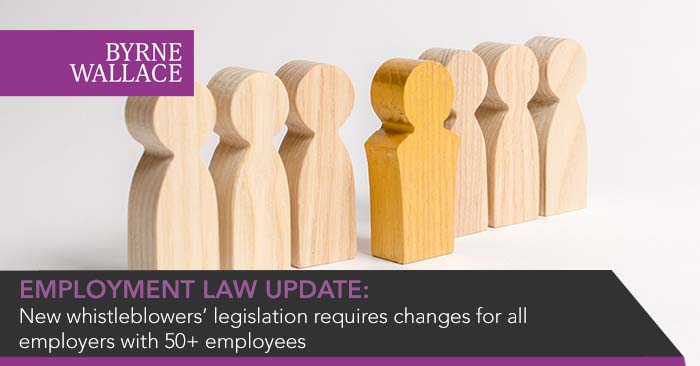New whistleblowers’ legislation requires changes for all employers with 50+ employees
Monday, 14 February 2022
The Protected Disclosures (Amendment) Bill 2022 (the “Bill”) was published on 9 February 2022 by the Minister for Public Expenditure and Reform, Michael McGrath TD.
The purpose of this Bill is to transpose EU Directive 2019/1937 (the “EU Whistleblowing Directive”) into Irish law and extend the scope of the protections for whistleblowers.
Only 10 EU Member States, including Ireland, already have comprehensive legal protections for whistleblowers. The principal legislation in Ireland is the Protected Disclosures Act 2014 (the “Act of 2014”). The Bill will amend the Act of 2014 to give effect to the EU Whistleblowing Directive and to broaden the provisions of the protected disclosures regime.
New obligations will eventually apply to all private-sector employers with 50 employees or more.
Key provisions of the proposed legislation
The Bill amends the definition of “relevant wrongdoing” (the types of wrongdoing that a person may disclose under the legislation). The amendments will:
- protect people who disclose breaches of a range of EU laws that are prescribed in the EU Whistleblowing Directive; and
- exclude from the definition of “relevant wrongdoing” any matters concerning interpersonal grievances, or matters which solely concern the reporting person. A person who raises personal grievances will not have special protection but will still be able to raise grievances through normal internal procedures.
This amendment seeks to address the issues raised in the recent decision in Baranya v Rosderra Meats [2021] IESC 77. In that case, the Supreme Court held that a complaint about health and safety issues affecting a single employee could constitute a protected disclosure under the Act of 2014 as it stands at present.
The Bill extends the scope of persons who are protected. The main focus of the Act of 2014 is to protect “workers”. The proposals would extend the definition of a “worker” so that it includes other categories of people, including: shareholders; volunteers; trainees; members of the administrative, management or supervisory body of an undertaking (e.g. board members); and those who acquire information during a recruitment or other pre-contractual process (e.g. job applicants).
Recipients of anonymous disclosures will not be obliged to accept and follow up on anonymous disclosures. However, a person who makes an anonymous protected disclosure – and whose identity subsequently becomes known – will be entitled to the protections of the legislation.
The Bill places an obligation on all private-sector organisations with 50 or more employees to establish formal channels and procedures for their employees to make protected disclosures. A derogation from this requirement will apply to undertakings that employ between 50 and 249 employees until 17 December 2023. After that date, the obligation will apply to undertakings that employ 50 or more people. All public sector organisations, regardless of size, are already required to have formal protected disclosures procedures in place under the Act of 2014 and this will continue.
Affected employers will be subject to an obligation to:
- provide internal reporting channels for the making of protected disclosures;
- acknowledge receipt of the protected disclosure within 7 days;
- diligently follow-up on the information contained in the protected disclosure; and
- provide feedback to the reporting person on the actions taken or envisaged to be taken as follow-up within 3 months.
The office of a Protected Disclosures Commissioner will be established within the Office of the Ombudsman. This Commissioner will:
- publish information in relation to the provisions of the Act of 2014;
- receive and redirect, as appropriate, protected disclosures to prescribed persons or other persons who are suitable to follow-up on each disclosure; and
- in cases where a prescribed person or suitable person cannot be identified, follow-up directly on disclosures referred to the Commissioner.
The Bill increases the range of remedies available to people who allege that they have been penalised for making a protected disclosure. “Interim relief” – i.e. the ability to get a temporary injunction from the Circuit Court before the full hearing of the claim – will be made available in all cases of alleged penalisation (at present it is only available in cases of dismissal).
The Bill also reverses the burden of proof in claims for penalisation for making a protected disclosure before the Workplace Relations Commission. Under the new provisions, an act of alleged penalisation shall be deemed to have been a result of the employee making a protected disclosure, unless the employer proves that the alleged act of penalisation was based on duly justified grounds. This is a departure from many other employment statutes, where a claimant must first make a prima facie case before the burden shifts to the employer to prove its innocence.
Employees may be awarded up to 5 years’ remuneration as compensation for penalisation, and non-employees who have been penalised will be eligible to be awarded up to €15,000.
The bill will create a number of new criminal offences, including:
- penalisation or threatening penalisation against a discloser;
- failing to establish internal reporting channels for protected disclosures;
- knowingly making a false disclosure; and
- breaching the confidentiality provisions around the identity of a discloser.
As an employer, what should I do?
Employers (other than private-sector employers with less than 50 employees) should prepare to put in place the formal reporting channels and procedures that are required under the Bill. Employers with more than 250 employees will need to move quickly, as the provisions of the Bill will apply to these employers immediately once the Bill is enacted. For employers who already have protected disclosures procedures in place, these will need to be re-examined in light of the requirements contained in the Bill.
The Bill is currently making its way through the Dáil. It is expected to become law in the coming months.
For further information please contact Loughlin Deegan or Brian Murphy from the ByrneWallace LLP Employment Law team or your usual ByrneWallace LLP contact.

